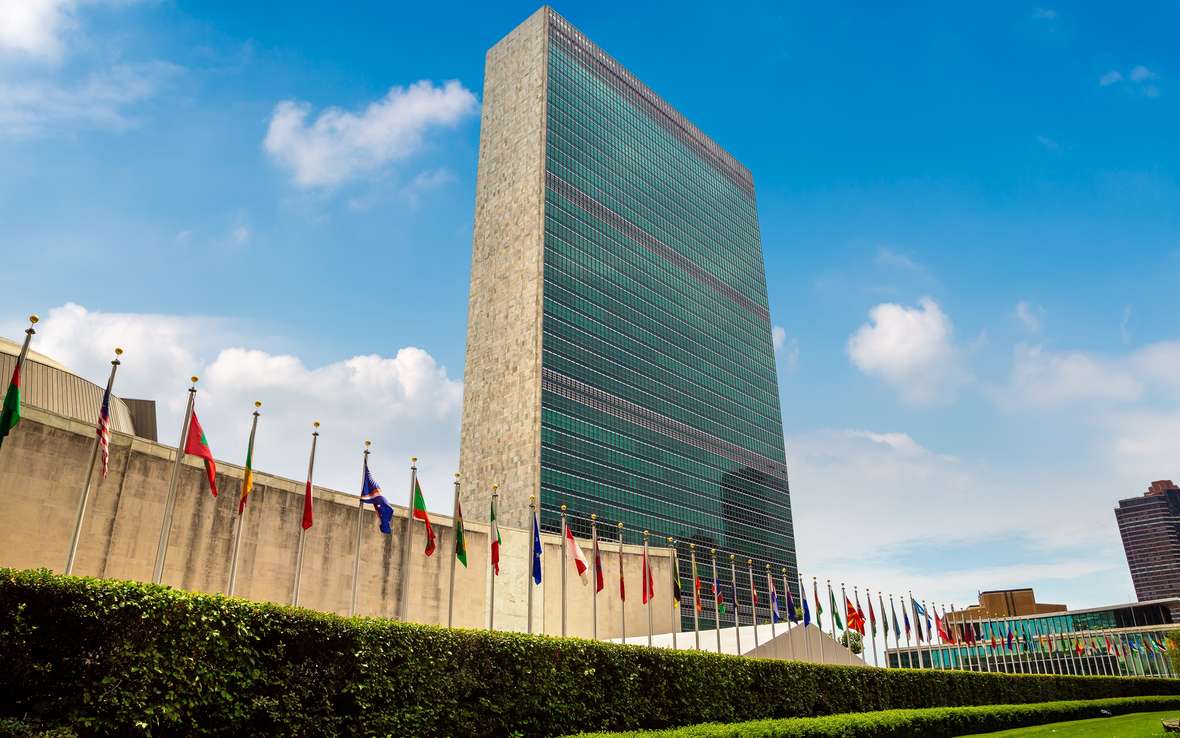A new tax treaty is a chance for needed change.
This month, something historic occurred—not that you’d know by paying attention to the headlines. Countries began negotiating the text of a new tax convention—one that has the potential to drastically improve global tax rules and help countries raise the money needed to provide the basics, like quality public education and healthcare, for billions of people.
Whether you want to fight oligarchy, end global poverty, or tackle the climate crisis, the road to doing so runs through tax. That’s why delegates representing countries around the world crowded into a negotiating room at the UN to start talks on a binding tax treaty, joined by experts and trade unions, as well as tax justice, faith-based, human rights, anti-poverty groups and more.
Noticeably absent was the world’s largest economy. The United States dramatically walked out of preparatory negotiations in February, shortly after President Trump took office. The good news is the world is moving on – and forward, with an ambitious effort that could help deliver meaningful solutions to some of the most urgent crises of our times. It’s the US that could be left behind.
Why a new tax convention?
That the very richest people and largest corporations too often pay too little to nothing in tax is increasingly well-understood—and an entirely man-made travesty that can be fixed. It’s not right for billionaires whose wealth is surging to pay just 0.3% in taxes while 3.7 billion people live in poverty. Fixing this injustice and raising vital revenue is the driving ambition behind the push for a new tax convention.
Global South countries, which are disproportionately harmed by tax abuse, have led a decade-plus effort to get us here. African countries moved forward with a key resolution at the UN, which passed in late 2023 with the overwhelming support of 125 countries—despite ‘no’ votes from 48 states (including many rich nations). Momentum has only grown since then. In 2024, when countries approved terms of reference—which relate to the objectives, principles, and commitments the treaty will cover—just nine countries voted against the measure. Over the next two years, countries will negotiate a “framework convention”—a treaty with legally binding commitments that also allows for more detailed elements to be adopted over time—for presentation to the General Assembly in 2027 and, ultimately, ratification by countries.
The potential wins are tremendous. We could update outdated rules on taxing rights for a globalized world, so that governments can finally raise decent revenue from multinational corporate giants that make billions in countries while avoiding taxes. The black box secrecy that allows many of the uber-wealthy to hide assets could be fixed though new transparency mechanisms set up under the convention—like a global asset registry—turbocharging efforts to make the super-rich pay their fair share. Such international cooperation would be a boon for national-level efforts to achieve fairer tax policy, raise revenue for priorities like climate action, and reduce inequality.
Tax can seem abstract or technical, but what’s really at stake is whether societies provide for people or let the very richest individuals and largest corporations continue to hoard wealth. The revenue raised could go a long way towards relieving debt-distressed countries and funding languishing development goals.
The Trump inequality agenda, at home and abroad
Exiting treaty negotiations is far from the Trump administration’s only swipe at international tax cooperation. President Trump recently strong-armed G7 countries to largely exempt US corporations from a 2021 international tax deal meant to help stop the race to the bottom. He’s also threatened countries for imposing digital services taxes and carbon taxes on shipping. Of course, these moves are part of a broader and deeply harmful rejection and undermining of multilateral efforts, including on climate, public health, and development.
When President Trump claims that rejecting international tax cooperation benefits US workers and families, he’s selling a false bill of goods. Reforms to bring the US into compliance with that 2021 deal—agreed to by President Biden—could have raised hundreds of billions of dollars for the US, if lawmakers hadn’t tanked the legislative changes necessary. The real beneficiaries of this unilateralism are not the American people, but rather large corporations that can continue to avoid paying taxes, and their wealthiest shareholders and executives.
That shouldn’t be a surprise. President Trump’s domestic agenda has hardly been kinder to the vast majority of people in the US. Despite publicly positioning himself as a champion of the working class, President Trump’s signature accomplishment has been—with the help of Republicans in Congress—carrying out a historic act of cruelty that redistributes wealth upwards. The recent passage of his destructive tax bill will hand an estimated $66,000 to the richest 1% of taxpayers annually on average in tax breaks, and take away healthcare and food from millions of people. That’s alongside moves to gut organized labor, dismantle consumer and environmental protections, impose chaotic tariffs that are likely to raise the cost of living especially for low-income households, and more.
The path forward
Tax negotiations at the UN hold immense promise. They could achieve a paradigm shift in who our economies serve, putting ordinary people and their governments on a much better footing vis-a-vis corporations and super-rich tax evaders. It’s why leading experts like Joseph Stiglitz, José Antonio Ocampo, and Jayati Ghosh consider this a historic "opportunity to curb the revenue losses that all countries (including rich countries) and their people suffer due to untamed tax abuse." To be clear, the process is at an early stage and could go awry, but the first two weeks of negotiations were hopeful.
A number of observers consider the US’s exit to be for the best—for now—given the likelihood that the Trump administration would undermine negotiations. The country’s absence could give the rest of the world breathing room to work out sensible rules that can make a real difference. While this may help with diplomatic talks, ordinary people in the US will suffer if the country maintains its misguided unilateralism for long, and global efforts to raise revenue will also be set back. The winners (no surprise) will be the large profitable corporations and super-rich individuals who pay far too little in tax.
It doesn’t have to stay this way. Just as with other global issues, like trade and the climate crisis, it’s urgent to start planning for how US tax policy—foreign and domestic—can finally advance working-class interests.



